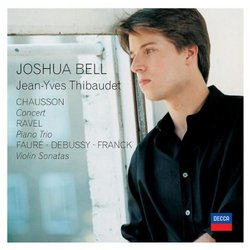| All Artists: Joshua Bell, Jean-Yves Thibaudet, Steven Isserlis Title: Chausson: Concert; Ravel: Piano Trio; Fauré, Debussy, Franck: Violin Sonatas Members Wishing: 0 Total Copies: 0 Label: Decca Release Date: 5/10/2005 Genre: Classical Styles: Chamber Music, Forms & Genres, Concertos, Historical Periods, Classical (c.1770-1830), Instruments, Strings Number of Discs: 2 SwapaCD Credits: 2 UPC: 028947567097 |
Search - Joshua Bell, Jean-Yves Thibaudet, Steven Isserlis :: Chausson: Concert; Ravel: Piano Trio; Fauré, Debussy, Franck: Violin Sonatas
 | Joshua Bell, Jean-Yves Thibaudet, Steven Isserlis Chausson: Concert; Ravel: Piano Trio; Fauré, Debussy, Franck: Violin Sonatas Genre: Classical
|
Larger Image |
CD Details |
CD ReviewsFrench Romantic Chamber Music Alan Lekan | Boulder, CO | 02/28/2006 (4 out of 5 stars) "The chamber music literature of the French Romantic era is exceedingly rich and rewarding - even if its gems were not so well known through history. This two-CD set showcases five prominent "French Romantic" composers and some of their more delectable works that frequented the aristocratic salons of 19th-century Paris. There was also a strong, interconnected history among these French composers, and many older composers were teachers of the younger generation. The eldest, Cesar Franck [1822-1890] of Flemish birth, was dearly loved by his students which included Chausson [1855-1899]. Chausson later became one of Debussy's [1862-1918] only mentors - quite a compliment given Debussy's fierce independance. Towards the end of the century, Maurice Ravel [1875-1937] studied under Gabriel Faure [1845-1924] at the Paris Conservatoire (where Franck also taught earlier). As composers, many were "late bloomers" who wrote their best works late in life. Franck and Faure are the oldest closest to classicism while the newer generation of Ravel and Debussy developed a completely new language of form and harmonies that paved the way to the "modern era" after the turn of the century.
Each composer was devoted to restoring prominance in French instrumental music which was greatly overshadowed by the fashionable Parisian operas. Franck's Violin Sonata in A-major became his most-loved chamber work - as was Faure's not-so-different Violin Sonata (also in A-major). Both are mainstays in the repertoire today. Yet, during the composers' lifetimes, Faure's and Franck's music was barely known outside France. Perhaps one reason was that (like Ravel) they were quiet, unassuming gentlemen - unlike self-promoting contemporaries like Richard Wagner. Yet, with Chausson, Massenet, d'Indy and later Saint-Saens, they all wrote sensuous, chromatically rich and well-conceived music that was uniquely expressive and innovative. Ravel's Trio is just one of his fascinating, small-scale pieces that has enjoyed great popularity, where the Debussy Trio is an early work rich in sonority and melody. Into his third decade as a performer now, Joshua Bell usually needs no introduction. His talent is top - technically, lyrically, artistically and tonally - even if some dislike the marketing machine he submitted to. Bell particularly excels in the Romantic repertoire with his deep emotivity and tonal beauty (especially since acquiring the stunningly beautiful and very expensive "Gibson" Stradivarius around 2001). These pieces with French pianist Thibaudet were recorded in 1989/1990 and were re-released in 2005 in this budget, two-CD set. I think the strength of this set is the program - really excellent pieces and some of the creme. Among these, the Ravel Trio (and perhaps the Chausson Concert) are the stars of the set. Joining the duo on Ravel's Trio is the superb British Cellist, Stephen Isserlis, with the legendary Hungarian Takacs Quartet for the Chausson Concert (a rather unique arrangement that comes off quite nicely). This trio of top-flight musicians brings out Ravel's fascinating tonal nuances and textures with a marvelous touch that makes it a competitive choice among many. The Chausson piece is delectable - a work bathed in French romantic beauty. As for Thidbaudet's pianism, one would be hard-pressed to fault anything in his support of Bell and unto his own virtuosity. In particular, he shows some crisp and dynamic passage work in the outer movements of Chausson's Concert. However, with Bell on some other pieces - notably the Faure Sonata in A major - his violin sounds unusually "flat" at times to me. But, I think it has more to do with the Decca sound engineering than Bell's ability to shape the music. His violin seems projected too close and without sufficient "breathing space" for the tonal nuances and secondary reverberations to create a fuller, richer sound. This seems more noticable on the first disc (Faure, Franck, Debussy) but may not be apparent just listening to this disc (which sounds clean and crisp) without another reference point. But when compared to other recordings, this Decca recording sounded "stark" to me and lacking "colour." However, once you settle in, such sound nuances for most should not be that big an issue. So, overall, this is a really great collection of French Romantic chamber music - but not really definitive as to the performances or recorded sound quality. Compositions - 5; Performance - 4; Sound Quality - 3.5. Other highly recommended recordings for this era of French chamber music featured here include recordings from Kang/Devoyan (Naxos), Chung/Lupu (Decca), The Florestan Trio (Hyperion) and Gil Shaham's lovely Faure albumn (Vanguard Classics). " |

 Track Listings (11) - Disc #1
Track Listings (11) - Disc #1